Based on what I’m seeing with sites heavily impacted by the HCU, and what Google explained in its April documentation update, the combination of unhelpful content and poor UX can be an extremely problematic combination for site owners.

Update: 10/2/23:
Included a section about Google’s latest blog post on web.dev which covers how to effectively run ads without impacting performance, the user experience, etc.
———-
On September 14, 2023 Google rolled out the September helpful content update. This was the third helpful content update, and it has been the biggest of the three HCUs so far. I have over 500 domains documented so far that have been hammered by the update, and my list continues to grow each day.
Here are some examples of the extreme drops based on the September HCU. These are medieval Panda-like drops:
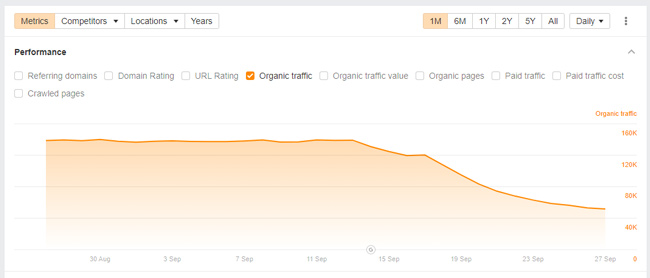
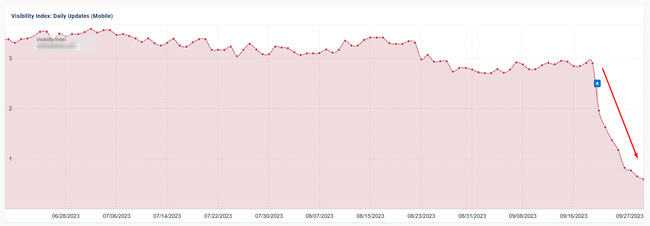

I might write a post covering more about the update once the dust settles, but I wanted to cover a specific theory I had based on analyzing many sites impacted by the update. First, after going through those sites, most just don’t have great content… I’m seeing AI-generated content, programmatic content used to churn out many unhelpful pages, sites that cover every imaginable variation of a topic without providing truly insightful or valuable information, and more. Also, I have analyzed sites that have dropped heavily across a number of categories, including lyrics, calculations, travel, translations, downloads, gaming, and many more.
Clearly the system is targeting unhelpful content, but that’s not the only thing I’m seeing. Some other sites I analyzed have definitely caught my attention. I’m not saying they have the best content in the world, but they don’t seem to have the worst content either… For example, there are sites that got crushed in the recipes, how-to, and reviews verticals that don’t fall into the same category of unhelpful content as what I explained earlier.
And a common thread on many sites impacted, including ones with content that may not be horrible, is a terrible user experience. In other words, the ad situation is severe on many of the sites, users are being bombarded with ads all over the page, auto-playing video follows you as you scroll down the page, and then you might be hit with popups as well.
This is exactly the type of aggressive, disruptive, and even sometimes deceptive, advertising situation I have spoken about for years. And when I say years, I mean from medieval Panda days back in 2011. I saw that on many sites I was helping recover from Panda. And now here we are, with what looks like Panda on steroids. I have always said, “hell hath no fury like a user scorned” and I feel like that might be the motto for the latest HCU.
First, here’s a slide from one of my presentations about broad core updates where I cover aggressive ads:
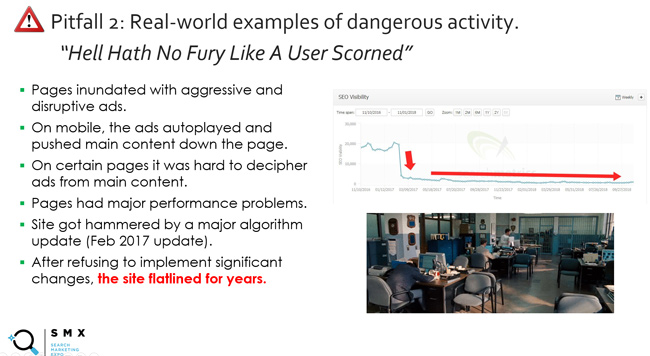
And then just one of many tweets I’ve shared about aggressive ads and core updates (this one links to a video from John Mueller explaining more about taking a step back and reviewing the site overall):
And I even covered this on a podcast with Dre last Friday when covering what I’ve seen so far (at 55:10 in the video):
The HCU evolves to the HCU(X)?
With the original HCU in August of 2022, the sites that got hit were the most egregious from a content quality standpoint. But Google’s Danny Sullivan explained at the time that Google was serious about the helpful content system and that they would continue to improve it, and the system would evolve over time.
And evolve it did… the September 2023 helpful content update has been the most powerful of the HCUs so far (by a mile). Again, I have hundreds of domains documented that have been crushed by the update, I’ve also had many site owners reach out to me for help, and I’ve heard from many across verticals about the extreme volatility that the HCU is causing across sites. It’s a beast.
So what changed?
First, Google explained the HCU has an improved classifier, and that is clearly obvious. The sheer number of sites getting impacted is infinitely larger than previous HCUs. Second, and this is the heart of my post today, Google updated its documentation in April of 2023 about page experience, and specifically included that information in its documentation about creating helpful content.
Yes, this might have been the warning about what the September HCU was going to target. With that update to the documentation, Google took the emphasis away from core web vitals and wanted site owners to focus on the user experience overall. You can clearly see in the questions that Google covers a wider range of REAL user experience issues, versus a core web vital score that might be a few milliseconds off.
For example, Google covers an excessive amount of ads that distract or interfere with the main content, intrusive interstitials, how easily can visitors navigate to, or locate, the main content of the page, can users easily distinguish the main content from other content on your page, and more.
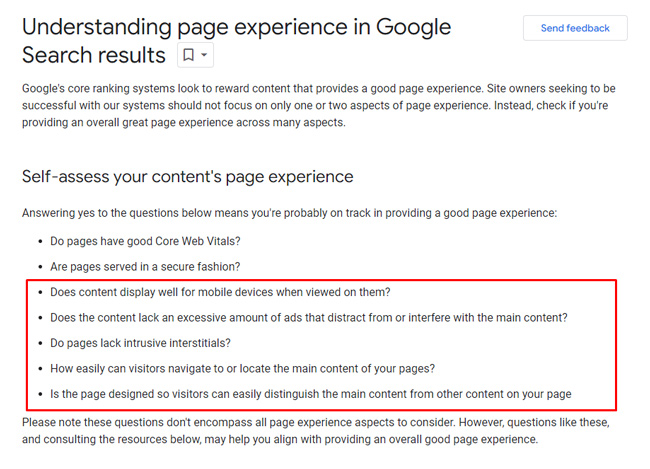
Again, I am NOT saying UX alone is going to get a site hammered. Google is using machine learning with the HCU, which means it’s sending many signals to the machine learning system, which dictates weighting of those signals, which ultimately dictates rankings. But the addition of this information in the helpful content documentation, and seeing those horrible UX situations across many sites impacted, has me thinking the two are connected.
Google also provided a specific FAQ in that blog post from April about the helpful content system. As you can see below, content is the focus, but UX does play a role:
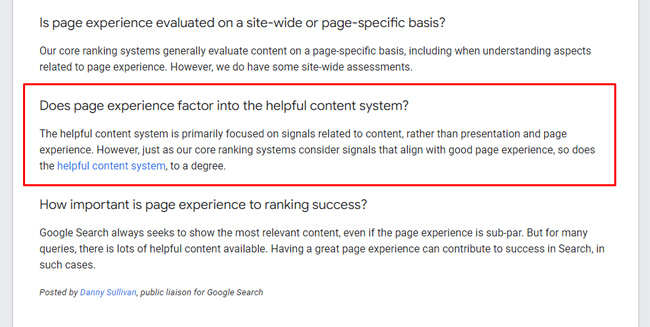
So, I believe the focus of the HCU is removing unhelpful content from the SERPs, but the user experience plays a part. And the combination of lower-quality content with a terrible UX is the kiss of death with the HCU. I explained in my SMX Advanced presentation a few months ago that the helpful content system was Google’s secret weapon for fighting various types of low-quality content, but it doesn’t seem like content is the only thing they are looking at algorithmically. In my opinion, UX crept its way in when they added that documentation change in April. I just don’t think it hit home with many site owners until this update rolled out.
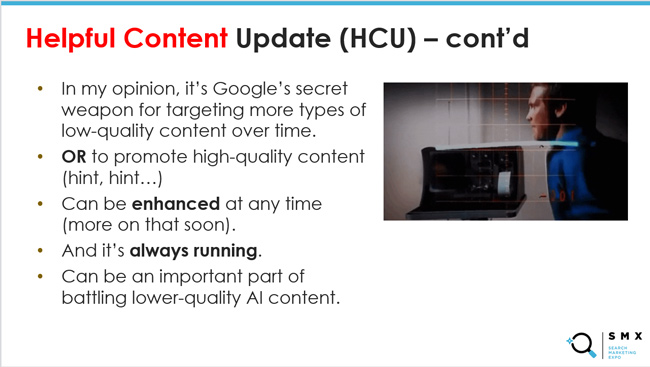
Improving The User Experience – And I’m not referring to core web vitals…
For site owners heavily impacted by the September 2023 helpful content update, the focus should clearly be on providing high-quality and insightful content that can help users. But, I would make sure you don’t drive those users insane while they are trying to consume your content. And if you’re in a situation where you think your content is ok, but you still got hammered, then definitely take a hard look at your UX, ad situation, popups, and more. I would not bombard users with ads, I would not trigger popups like crazy, I wouldn’t follow users down the page with auto-playing video, and I would make sure your main content can be easily and quickly identified by users.
Too close to your own site? Run a user study!
If you feel you are too close to your own site, then run a user study. I wrote a post about running user studies through the lens of broad core updates a few years ago and Google ended up linking to that post from their own article about broad core updates. You can learn so much when objective third-party users go through your site and evaluate their experience through the lens of specific algorithm updates. You can read my post for more details about running a study.
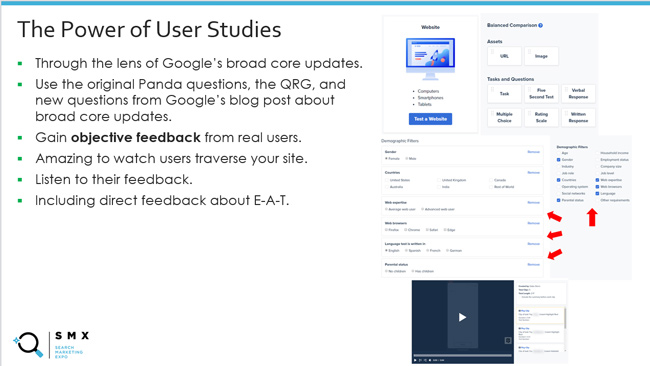
Update: Google’s new blog post on web.dev about ads and the user experience.
On Friday (9/29/23), Google’s Markus Bordihn published a blog post on web.dev covering how to effectively load ads without impacting performance, the user experience, etc. I found that timing to be very interesting considering the HCU just rolled out and UX seemed to be part of the equation (as covered throughout my post here).
I highly recommend reading the article from Markus as he covers how to provide ads without hammering the user experience. There are some great quotes in the post that I think many impacted by the September HCU should review in detail.
For example, take this quote about the need to balance generating revenue with a solid user experience (and not frustrating users):
“Consider a website that extensively places ads within its content, aiming to generate high revenue. However, the overwhelming number of ads frustrates users, leading to a poor user experience and high bounce rates. Despite the potential for substantial revenue from ads, abandonment severely hampers the website’s success.”
Or this quote about ads running above the fold (which reminds me of their ‘Page layout’ algorithm which launched years ago — AKA “Above the fold” algo):
“While above the fold ad placements are valuable, it’s important to not overload this prime space with too many ads. Excessive ads clutter the page, disrupt content readability, and detract from the user experience. Strive for a balance between monetization and maintaining a clean, user-friendly layout.”
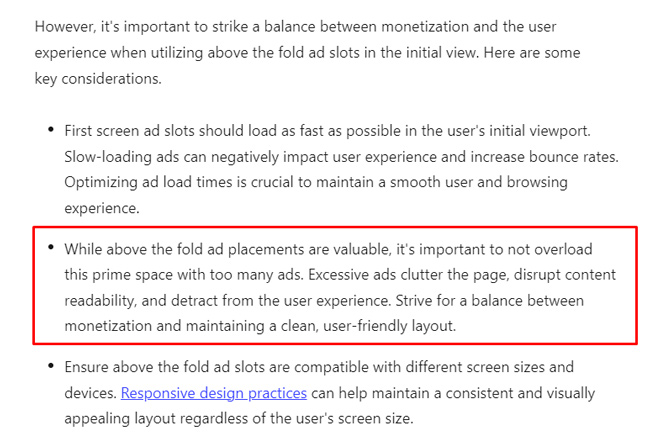
And then this quote about ads below the fold and how they shouldn’t compromise content quality or readability:
“The placements of ads below the fold should not compromise content quality or readability. Maintaining a balance between ads and content to avoid overwhelming users and to ensure positive user experience.”
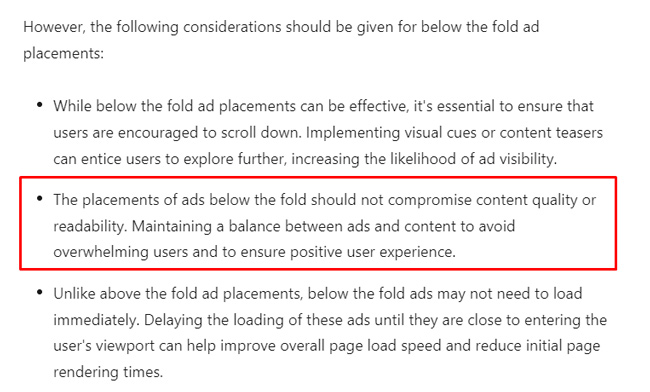
Again, that’s very interesting timing for Google publishing that post on web.dev. If you have been impacted by the September 2023 helpful content update, I highly recommend reviewing it (and then sharing it with all members of your team).
Summary: Dealing with a big September 2023 HCU hit.
Again, I might cover more about this update in a future post, but I wanted to provide this information about UX after going through many sites impacted by the September HCU, or should I say HCU(X)? Also, just a reminder that with the helpful content update, you typically cannot recover quickly. Google will need to see significant changes over the long-term in order for the HCU classifier to be dropped (which can be months). So if you have seen heavy impact, then you will need to work hard on improving both your content and the user experience. Good luck.
GG

